Recovering from Tropical Cyclone Winston
Report from Tutu Rural Training Centre, Taveuni, Fiji, May 2016
On 20 February 2016 severe category 5 Tropical Cyclone Winston struck many parts of Fiji. The island of Taveuni was one of the most severely affected areas. So were the home villages of the Tutu participants throughout Fiji Northern Provinces. The damage caused to housing, infrastructure and crops was on an unprecedented scale. This is the most damaging cyclone in recorded history for this region of Fiji.
Cyclone Winston struck at a time when a new intake of the three-year Young Farmers’ Course had just begun -- they had finished planting their taro and yaqona blocks at Tutu; a new six-month Farming Married Couples’ Course was scheduled to commence in March; and village-based courses were programmed to begin over the next few months.
This report is a brief account to all the generous donors who sent cash to assist us in the immediate needs of rehabilitation. The response to our need has been absolutely amazing and has given us a boost beyond imagining as we began picking up the wreckage, humbly grinning and beginning again.
Caritas Aotearoa New Zealand and Caritas Australia have facilitated the major costs of our rehabilitation.
The 20th of February was a Saturday. On Sunday some of us walked to Wairiki to see how others had fared. Normally this walk takes 15 minutes. It took us three and a half hours. Making progress necessitated going out into the sea as the road no long existed -- going on land meant continually climbing over fallen trees.
We all met on Monday morning and divided into groups for initial clearing of the major roads so we could restore electricity, water, and access to salvage any crops possible.
Water and Electricity
Electricity was fully restored quickly, thanks to Tutu’s past investment in a robust hydro-electricity system with all wires underground. Acting as one of the government evacuation centres, Tutu is now one of the very few locations on Taveuni that has electricity. This has enabled significant amounts of mature uprooted yaqona belonging to the Centre and to staff to be dried, and salvaged for sale.
The water supply has now been fully restored in most areas. Tutu now supplies to the seven surrounding villages.
Buildings
Nine buildings received major damage losing roofs, doors, walls and in one case a concrete block wall. Thanks to donations received we were able to buy materials immediately and to date six of the buildings have been restored to use, even though further work remains to be done. We are fortunate in having a long-standing relationship with the local Government vocational carpentry centre. They number 24 young men with two instructors and have been here almost every day since Winston and have done the major carpentry work, which has left the Tutu staff and students free to deal with other urgent needs.
Crops
The damage to crops was very discouraging.
22,000 taro plants were destroyed, most of which belonged to the Young Farmers. Using the donations received, we have been able to buy suckers, and had bought and planted 17,460 by the end of May. The target is 115,000.
106,000 yaqona plants were destroyed, about half of which belonged to the Young Farmers.
All vegetable crops were destroyed. Seedlings from the nursery that were placed inside the disaster-mitigation shipping container were saved and are now ready for replanting, which has begun. Because we were able to use the container we are actually the first people to go to market with vegetables.
The breadfruit orchards are resilient. While the fruit has been lost, most of the trees remain intact. These trees are expected to produce fruit within three to six months, which will make an important contribution to food security at Tutu.
Most of the newly planted fruit trees introduced under the Caritas Sustainability Program have survived. Again thanks to the nursery material going into the container we were able to save 2,300 potted fruit trees which are now being planted out.
The substantial plantings of teak and sandalwood trees planted under the Caritas Sustainability Program have survived well. This augurs particularly well for the long-term viability of Tutu.
Almost all coconut trees suffered severe damage. A decision has been made to replace the damaged coconut trees with teak, whose value and resilience to cyclones has been demonstrated. Coconuts were our organic cash crop -- gone for the next few years.
Road access
The repair of the road network was 60% complete bythe end of May. Some progress has been made in clearing and repairing the farm access road system.
A significant plus
With all the trees and branches littering the property we invested in a chipper and now we are making trailer loads of chips for composting.
The Future?
There is still a great deal of work to do so that the Training Centre becomes fully operational again. We are full of hope and confidence, though, as we continue to put things right.
The generosity of our benefactors has inspired and enlivened us in our work. Many, many thanks to you all! Be assured of our prayers for you, and please pray for us!

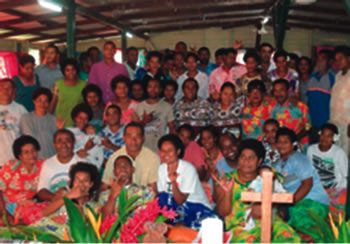
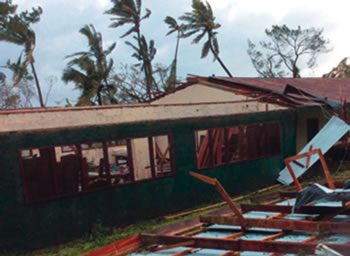
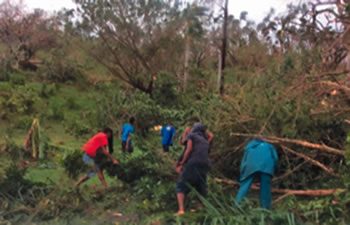
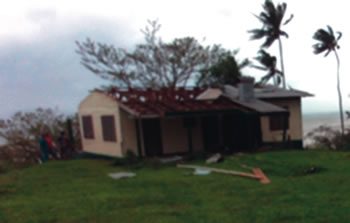
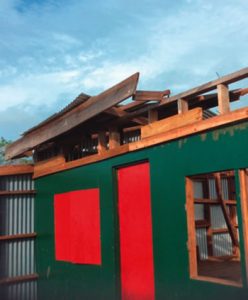
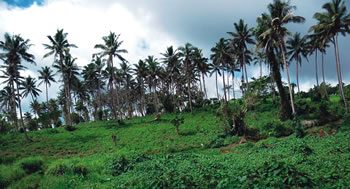
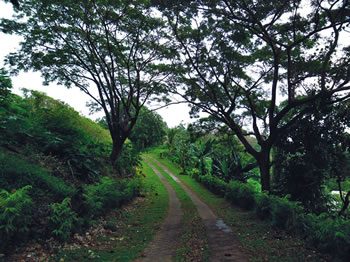
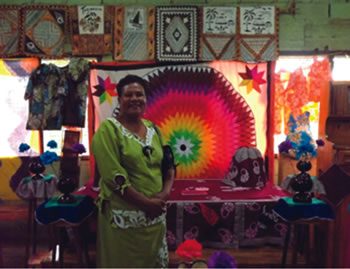
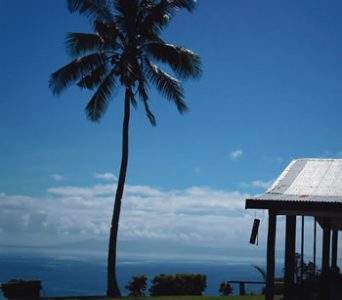
 Entries(RSS)
Entries(RSS)